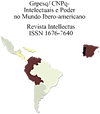O ressurgimento do fascismo no mundo contemporâneo: história, conceito e prospectiva
DOI:
https://doi.org/10.12957/intellectus.2022.71657Palavras-chave:
fascismo, liberalismo, sistema-mundo, Estados Unidos, América Latina.Resumo
Neste artigo analisamos o fascismo, tomando em consideração alguns dos principais debates teóricos, suas formas históricas, sua inserção temporal no sistema-mundo para avançarmos na proposição de uma definição conceitual que seja capaz de articular suas dimensões centrais às conjunturais e contingenciais, apontar suas tendências prospectivas e sua importância como fenômeno do mundo contemporâneo. Abordamos sua relação com o liberalismo e o conservadorismo e as formas que assume no mundo contemporâneo nos Estados Unidos, Europa e na América Latina.Downloads
Referências
BOBBIO, Norberto (1997). Dal fascismo ala democracia: I regime, le ideologie, le figure e le culture politique. Milano: Baldini & Castoldi.
DIMITROV, Georgy (s/d). Georgy Dimitrov: selected works in three volumes. Sofia Press.
SANTOS, Theotonio dos (1978). Socialismo o fascismo: el nuevo carácter de la dependencia y el el dilema latinoamericano. Mexico: Edicol.
HAYEK, Frederich (1944). O caminho da servidão. Rio de Janeiro: Instituto Liberal.
HAYEK, Frederich (1966). The principles of a liberal social order. l Politico, v. 31, n. 4, Diciembre, pp. 601-618.
HAYEK, Frederich (1982). Law, legislation and liberty. Routledge and Kegan Paul.
HARO, Lea (2011). Entering a Theoretical Void: The Theory of Social Fascism and Stalinism in the German Communist Party. Journal of Socialist Theory, volume 39, issue 4.
HUNTINGTON, Samuel (1991). The third wave democratization in the late twentieth century. Oklahoma: University of Oklahoma.
LUKÁCS, Gyorgy (2020). A destruição da razão. Instituto Lukács.
MANDEL, Ernest (1969[1962]). Tratado de economía marxista, tomo II. México D.F: Era.
MANDEL, Ernest (1978). Sobre el fascismo. Lisboa: Antidoto.
MARTINS, Carlos Eduardo (2018). A teoria marxista da dependência à luz de Marx e do capitalismo contemporâneo. Salvador: Cadernos CRH v.31, n. 84, set/dez. Disponível em: https://www.scielo.br/j/ccrh/a/K8Pwwgmy8hG7Dnqn3cjSVzS/?lang=pt . Acesso em: 10 nov.2022.
MARTINS, Carlos Eduardo (2020). Dependency, neoliberalism and globalization in Latin America. Leiden: Brill.
MARTINS, Carlos Eduardo (2022). The Longue Durée of the Marxist Theory of Dependency and the Twenty-First Century. Latin American Perspectives, 49(1), 18–35, Disponível em: https://doi.org/10.1177/0094582X211052029 . Acesso em: 10 nov. 2022.
POULANTZAS, Nicos (1976). Fascismo y dictadura: La III Internacional frente al Fascismo. México D.F: Siglo XXI editores.
REICH, Wilheim (1972). A psicologia das massas do fascismo. Madrid: Editorial Ayuso.
ROSENBERG, Alfred (1978 [1924]). The folkish idea of State (p: 59-73). In: Lane Barbara and Rupp (org.) Nazi ideology before 1933: a documentation. Austin: University of Texas Press.
THAILHEMER, August (2009). Sobre o fascismo. Salvador: Centro de Estudos Victor Meyer.
TOCQUEVILLE, Alexis (2000). Democracy in America. Chicago: University of Chicago Press.
WALLERSTEIN, Immanuel (1995). After liberalism. New York: New Press.
WALLERSTEIN, Immanuel (1983). Historical capitalism and capitalist civilizations. London & New York: Verso.
VON MISES, Ludwig (1927). Liberalism in the classical tradition. San Francisco: Cobden Press,
VON MISES, Ludwig (1944). Onipotent government: the rise of total state and total war. Yale: Yale University Press.
Downloads
Publicado
Como Citar
Edição
Seção
Licença
Autores que publicam nesta revista concordam com os seguintes termos:
Os autores mantêm os direitos autorais e concedem à revista Intellèctus o direito de publicação, sob uma Licença Creative Commons Atribuição 4.0 Internacional, a qual permite que outros distribuam, remixem, adaptem e criem a partir do seu trabalho, mesmo para fins comerciais, desde que lhe atribuam o devido crédito pela criação original.
Os dados e conceitos abordados são da exclusiva responsabilidade do autor.
A revista Intellèctus está licenciada com uma licença Creative Commons Atribuição 4.0 Internacional





